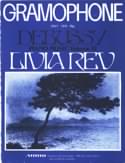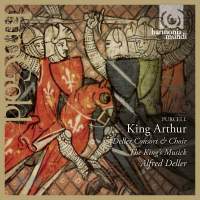Texte paru dans: / Appeared in: |
|
|
Outil de traduction (Très approximatif) |
|
|
Reviewer: Roger Fiske
No early full score of King Arthur survives and the music was not published in anything approaching complete form until 1843. We still lack the music for when Emmeline regains her sight, and though the Act Tunes and Trumpet Tunes were published in theatre collections soon after Purcell 's death i t is anyone's guess whereabouts in the score they were played. Thus King Arthur offers quite a picnic to musicologists and often one man's guess is as good as another's. Both these recordings, as also the Novello vocal score, end with the F major Chaconne, and this might seem to be justified by the last reference to music in Dryden's libretto: "Grand Dance; Chaconne", but to my ears the unexpected key switch sounds totally unconvincing and even unpleasant. Purcell nearly always tried to keep anyone act as far as possible in one key, and his Act 5 was surely in C. The Purcell Society edition very sensibly puts this Chaconne at the start of the opera as " First Music", it being in the Act I key of F, and if this is correct (and I think it is) then Purcell's final Chaconne must be lost. I myself think the C major chorus, "Our Natives", makes a good enough end in an age when grand endings were unusual. Only Deller gives us the trumpet song, "St George", just before this chorus. Its authenticity has been doubted; perhaps it was added for an early revival , the original having already disappeared . It's worth having though it needs singing with a little more swagger. Deller re-scores a bar or two of the opera here and there, and the contrast of violins and oboes at the start of the overture makes good sense, though I'm unenthusiastic about some of his double-dotting a little later. The entrancing duet "Hither this way" sounds more piquant and alive than on the old Oiseau-Lyre discs , but the "Frost Chorus" is less dramatically managed, and though the orchestral ending sounds delightful played presto as a separate piece the effect would have surprised Purcell. The 'topless' water nymphs sound much more likely to seduce King Arthur in the Deller than in the Anthony Lewis version (and what a lovely song this is), and Rosemary Hardy sings Cupid and other roles with just the right pert prettiness in spite of her difficulties with the letter 's'. In "Fairest Isle" Honor Shepherd prefers A flat in bar 3, Heather Harper (in the Lewis version) A natural; this is a famous crux, the sources giving both notes. I'd root for A flat myself on the grounds that a copyist might easily leave out an accidental by mistake but would surely not put one in. Not that it matters . The disrespectful song about the parson is much more 'mummerset' in the Deller version, some may think too much so, but you can't not enjoy it . Lewis makes the marvellous Act 4 Chaconne sound stately and rather melancholy with entrancing effect, but some may prefer Deller’s quicker tempo and more cheerful approach.
There is some splendid singing from Maurice Bevan on Deller's recording, but as a whole the soloists on the old discs have a little more presence (I have not yet mentioned Elsie Morison, Wilfred Brown and Hervey Alan). But for many this will be more than offset by the powerful attraction of 'old instruments' on the new discs . Not that the violins are always immaculate as regards ensemble, but then they aren't on the rival discs either. Deller aims at more expression than Lewis, making the orchestra and sometimes the chorus lean on the main beats in a way that can hardly have prevailed in Purcell's day; once noticed, the trick can be a mild irritant.
By now it will be apparent that I
don't know which of these excellent recordings to recommend. Or rather I want to
recommend both. The new one is the better as regards sound. There's nothing in
it as regards price. The music is a wonder. |
|
|
|
|
|
Cliquez l'un ou l'autre
bouton pour découvrir bien d'autres critiques de CD |
|




